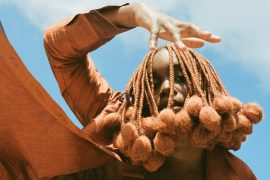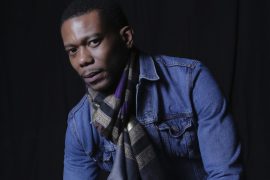This Black History Month, Atwood Magazine has invited artists to participate in a series of essays, interviews, reviews, poetry, playlists, and more features in recognition of, and out of respect for the symbolism and significance of this month.
Today, Tulsa, OK-based artist Tori Ruffin shares his personal essay “Electric Purgatory” as a part of Atwood Magazine’s Black History Month series. The founder, chief visionary, and leader of genre spanning band Freak Juice, Ruffin has a vast resume of work across multiple genres of music and has recorded, toured and hit with some of the heaviest and most iconic artists in music, including Prince, Morris Day, Lenny Kravitz, Mariah Carey, Aretha Franklin, TLC, Bobby Brown, Slightly Stoopid, DJ Quick, SugaFree, Snoop Dogg, Dr. Dre, Michael Jackson, Smokey Robinson, Euge Groove and H.R. from Bad Brains. In addition to leading Freak Juice, he is also currently gigging with the legendary Morris Day & The Time and has also toured & recorded with the Godfathers of punk rock and ska, Fishbone.
Tori Ruffin will also be reprising his role in Eddie Murphy’s Coming 2 America as the guitarist of Sexual Chocolate upon the film’s March 5th release. Ruffin’s band Freak Juice released their third full length studio LP They Call Us Juice in November 2020 via Horton Records.
•• ••
ELECTRIC PURGATORY
by Tori Ruffin

Isms color many aspects of life in America. Some isms are good and some are bad. American Popular Music has numerous genres. It is a tree with many branches, colored with tones, sounds, melodies, and rhythms. You will find rock & roll, heavy metal, hip-hop, R&B, soul, country & western, jazz, funk, blues and gospel. Each of those with leaves and flowers that are sub-genres of their main branch. The artists that created and continue to create the music that define the aforementioned genres are numerous and stretch back decades into the past.
Here in America, the roots of American Popular Music arguably began in two places, but from one people. From African Americans in the church, who gave us gospel, and the from those who worked in the fields prior to the American Civil War, they gave us the blues. It can be said that gospel gave us hope and joy and the blues, spoke of heartache and pain. The guitar was an instrument that helped countless known and unknown artists express their thoughts, emotions, spirit in their hearts, minds and souls of their people. And while the expression of what was going on with folk was articulated in the universal language of music, a funny thing happened that impacted who was able to achieve success and how much of that success they would be able to attain — race and racism remained at the forefront of American music.
American racism was responsible for the Atlantic Slave Trade, the brutality of the Middle Passage, the crime against humanity known as American Slavery, and all of the subsequent separation of people based upon racism and the isms it birthed. Including, but not limited to, colonialism, sexism, classism, etc. The isms are tricky.

And yes, even music was not immune from the cancer, the original sin of America – racism.
American racism in the early days of American Popular Music led to the separation of artists, where music was played, in which venues it could be listened to in and even who was allowed to move to it and how or where they could dance to it.
Even today, racism still impacts American Popular Music and the artists themselves. For this op-ed, let’s focus in on the Black Guitarist and their journey past and present. The first “guitar slingers” were African American Bluesmen. Artists like Robert Johnson, Muddy Waters, Howlin’ Wolf, T-Bone Walker, BB King, Albert King, Freddie King, Buddy Guy and Albert Collins. The first Rock & Roll Guitar God was Chuck Berry. These artists picked up electric guitars, plugged into amps cranked all the way up and literally invented electricity. Their influence was so strong that it set the foundation for the British explosion of the 1960s. The Beatles, The Rolling Stones, The Who, Eric Clapton and many others worshipped the music created by African American blues, soul and rock artists.

Interestingly, an R&B sideman, who could play the hell out of some blues, played rhythm guitar for Little Richard, Ike & Tina Turner, Wilson Pickett, and the Isley Brothers, had to leave America for Britain because nobody could recognize his virtuosity and where he was coming from. That sideman was James Marshall Hendrix who the world came to know as Jimi Hendrix. He made the guitar howl in a manner that had never been heard before or since. He came from a place that none of contemporaries, Eric Clapton, Pete Townsend, Jeff Beck could remotely touch. From late 1966 until 1970, he was a comet who changed everything. Yet, in his wake there seemed to be no room for other “Black Guitarists.” Who decided that? Surely there were other African American guitarists who played rock and roll. Yet since Hendrix, you can probably count on one hand the “Black Rock Stars” who play guitar, Prince and Lenny Kravitz.
Yet there have been countless white guitarists. There has been plenty of room for new upcoming white guitarists following Clapton, Townsend, and Beck. Jimmy Page, Brian May, Joe Perry, Eddie Van Halen, Steve Vai, Joe Satriani, Stevie Ray Vaughan, Kurt Cobain, and numerous others were never saddled with the comparison to those who came before them in a manner that inhibited their growth opportunities. It appears that every time an African American guitarist comes along, they’re immediately compared to Hendrix and summarily dismissed. Ask Ernie Isley, Michael Hampton, Eddie Hazel, Vernon Reid, BlackByrd McKnight , even Prince. Hell, ask me!
There are numerous accomplished African American guitarists who have been on some of biggest hit records of all time, some of the largest revenue grossing tours and possess prodigious talent that leaves the average listener and fellow guitarist in awe, yet the toil in a type of obscurity that is mind boggling. The list is in no way complete, just a few that come to mind Parliament-Funkadelic guitarists Blackbyrd McKnight, Eddie Hazel, Glen Goins, Gary Shider, Michael Hampton and Ricky Rouse; NYC based underground legends such as Jimi Hazel, Jef Lee Johnson, and Eddie Martinez; Cameo’s Charlie Singleton; Lakeside’s Stephen Shockley; Rufus’ Tony Maitland, Maze’s Jubu Smith; The Gap Band’s Lonnie Simmons and Jimi Macon; Terry Scott, The Time’s Jelly Bean Johnson & Jesse Johnson; Marlain McClain, Al McKay from EWF, Teanie Hodges from Al Green, Freddy Stone from Sly & the Family Stone, SugarFoot from The Ohio Players, Johnny Guitar Watson, Chris Clermont, JJ Brown, Civil Rite, Pocket Honore, Wickod wisdom, Kevin Williams, Clyde grimes untouchables Stevie Wonders Morris O’connor James Brown’s guitarist Jimmy Nolan; Catfish Roger Troutman from ZAPP; Cat Dyson and Rhonda Smith from Prince; Arthur Lee from Love; Vic Johnson, Greg Howe and Tony Mac Alpine; Blues artists such as Ronnie Baker Brooks, Bernard Allison, Malina Moye, Christone Kingfish Ingram; and the incomparable Eric Gales; jazz & session guitarists Paul Jackson, Jr, Kenny Burrell, Mark Whitfield, Christian McBride, Bobby Broom, Cornell Dupree, David T. Walker, Russell Malone, and Grant Green; Kat Dyson Dwayne Cotton and Sheldon Fisher; Spacey T, John Bingham, Rocky George from Fishbone; Ernie C Marvin Mc Daniels Curtis Mayfield, Bobby Womack, Shuggie Otis and countless others. Their talent and accomplishments on record, in the studio and on the road are unrivaled and their influence cannot be measured.

Yet many remained unheard, unheralded and under recognized by the recording industry in the same manner their white counterparts were. The music industry, record labels, record executives, guitar trade magazines, instrument manufacturers often shower new up and coming white talent without hesitation or reservation. Yet accomplished African American guitarists seem to languish and struggle for opportunities and acclaim. Recording and touring opportunities are less than their counterparts and endorsements are fewer.
I’ve been a professional guitarist since 1981. I’ve done session work with Michael Jackson, Mariah Carey, Prince, Lenny Kravitz, Jimmy Jam & Terry Lewis, and Fishbone, to name a few. I’ve performed on stage with Snoop Dog, A Tribe Called Quest, Bobby Brown, Aretha Franklin and Brian McKnight and I’ve been the lead guitarist for Morris Day and the Time for nearly 25 years.

I consider myself fortunate; I am currently a Schecter Guitar Works, Ernie Ball, and EMG Pickups endorsed artist. I was previously endorsed by Mesa Boogie Amps. But I know numerous fellow counterparts who have had little if any endorsement opportunities and acknowledgment by the industry trade magazines, and I believe they deserve both and then some. Breaking into the Rock genre is a challenge, my band, Freak Juice, is an avant garde mixture of Rock, Be Bop, Funk and Hip-Hop. We’ve opened for national artists and listeners at our shows have been floored by our art. Yet Europe has given us more love than here at home. Some might say it’s just the way of the world, but sometimes I wonder. Once in Los Angeles a very high-profile music executive told me, “We’ve got our quota of Black Rock Bands.” While disheartening, me and my band persist.
We, myself, my band, African American Guitarists continue to endure and thrive despite the challenges and obstacles. I believe that if it were up solely to the listener, the appreciation, admiration and respect would increase exponentially. In fact, I think we see some of this occurring due to the growth of the internet and streaming. The downside of that is that artists don’t get paid equitably and fairly. But you do reach a broader audience. My ultimate hope is that we be given a fair shake by the industry and the supporting sector. If the people like what we’re playing, we’d like to receive some love by the industry.
Music is universal. It should not be hampered by isms.
— —
:: stream/purchase They Call Us Juice here ::
Stream: ‘They Call Us Juice’ – Freak Juice
— — — —

Connect to Freak Juice on
Facebook, Twitter, Instagram
Connect to Tori Ruffin on Facebook
Discover new music on Atwood Magazine
? © Phil Clarkin
:: Stream Freak Juice ::









